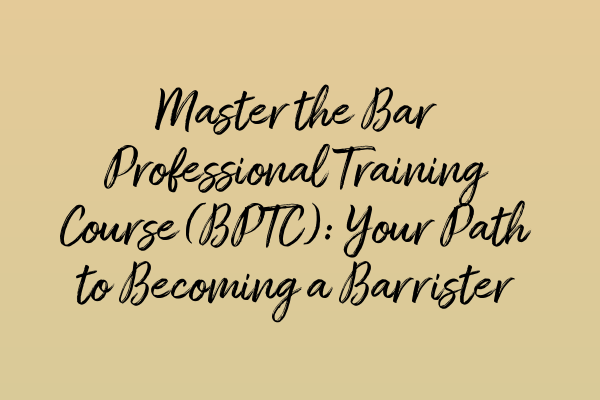Master the Bar Professional Training Course (BPTC): Your Path to Becoming a Barrister
Becoming a barrister is the dream of many law graduates. It is a prestigious and intellectually challenging profession that requires dedication and perseverance. One of the key milestones on the path to becoming a barrister is completing the Bar Professional Training Course (BPTC). In this article, we will explore everything you need to know about the BPTC and how to master it to excel in your career.
What is the Bar Professional Training Course (BPTC)?
The Bar Professional Training Course (BPTC) is a postgraduate qualification that provides aspiring barristers with the skills, knowledge, and practical training required to succeed at the Bar. It is the final stage of academic training before entering pupillage (the apprenticeship stage) and ultimately obtaining a practising certificate. The BPTC is an intense and rigorous course that aims to simulate the real-life experiences and challenges faced by barristers.
Key topics covered in the BPTC include:
- Advocacy Skills
- Conference Skills
- Case Analysis and Opinion Writing
- Legal Research Skills
- Professional Ethics
- Alternative Dispute Resolution (ADR)
The BPTC is recognized by the Bar Standards Board (BSB) and successful completion of the course is a prerequisite for pupillage. It is offered by various providers in England and Wales, both universities and private institutions.
How to Choose the Right BPTC Provider
Choosing the right BPTC provider is a crucial decision that can significantly impact your success in the course and ultimately your career as a barrister. Factors to consider when selecting a provider include:
- Reputation: Look for providers with a strong reputation within the legal profession. Check their success rates, student feedback, and alumni achievements.
- Teaching Standards: Ensure that the provider’s teaching standards meet your expectations. Research their teaching faculty, their expertise, and their industry experience.
- Resources and Facilities: Evaluate the resources and facilities offered by the provider. Adequate access to libraries, mock courtrooms, and study materials is essential for a comprehensive learning experience.
- Location: Consider the location of the provider, especially if you have specific geographical preferences for your future practice. Proximity to the legal hubs can provide networking opportunities.
Before making a final decision, visit open days, talk to current and former students, and gather as much information as possible to make an informed choice.
Mastering the BPTC: Tips and Strategies
Successfully completing the BPTC requires dedication, hard work, and effective study strategies. Here are some tips to help you master the course:
- Organize Your Schedule: Create a study timetable that allows for allocated time for each module. Prioritize subjects based on difficulty and allocate more time to challenging topics.
- Active Learning: Engage in active learning techniques such as participating in mock trials, group discussions, and oral presentations. This helps to develop and enhance your advocacy skills.
- Legal Research Skills: Legal research is a crucial aspect of a barrister’s practice. Familiarize yourself with legal research methodologies and resources. 48. Unlocking Legal Research Skills for SQE Success can provide additional guidance on honing your research skills.
- Practice, Practice, Practice: Regularly practice your advocacy skills in front of the mirror, with a study group, or by participating in mooting competitions. The more you practice, the more confident and polished your advocacy skills will become.
- Stay Updated with Legal News: Keep abreast of recent legal developments, case law, and legislation. This will help you develop a deeper understanding of the law and its practical application.
- Find a Mentor: Seek guidance from experienced barristers who can provide valuable insights and advice. Networking events and legal mentoring programs can help you connect with potential mentors.
- Get Feedback: Actively seek feedback on your performance from tutors, mentors, and peers. Constructive feedback allows you to identify areas for improvement and refine your skills.
- Time Management: Develop strong time management skills to juggle the demands of the course effectively. Prioritize tasks, avoid procrastination, and maintain a healthy work-life balance.
Remember that the BPTC is not only about academic excellence but also about developing the necessary skills, ethics, and professionalism required in the legal profession. It is important to adopt a holistic approach to your studies and work on enhancing all aspects of your legal practice.
Next Steps: Pupillage and Beyond
Upon successful completion of the BPTC, you will be ready to enter pupillage, the final stage of training to become a barrister. Pupillage provides you with the opportunity to gain practical experience under the supervision of an experienced barrister.
It is important to start preparing for pupillage early by researching and identifying chambers or organizations that align with your interests and aspirations. Network with barristers, attend pupillage fairs, and seek guidance from career advisors to enhance your chances of securing pupillage.
Throughout your career as a barrister, continuous learning and professional development are crucial. Stay updated with legal developments, attend seminars and training programs relevant to your practice area, and maintain an active professional network.
Now that you have a better understanding of the Bar Professional Training Course (BPTC) and how to excel in it, you are one step closer to achieving your dream of becoming a barrister. Remember to stay focused, work hard, and embrace the challenges that come along your journey! For more information on the legal profession, check out our related articles below:
- 62. SQE2: Everything You Need to Know About the Second Stage Exam
- 15. SQE Practice Areas: Choosing Your Specialization
- 3. Re-taking the SQE: Strategies for Success
- 53. Functioning Legal Knowledge (FLK): Core Concepts for SQE Candidates
Good luck on your journey to becoming a successful barrister!


Leave a Reply